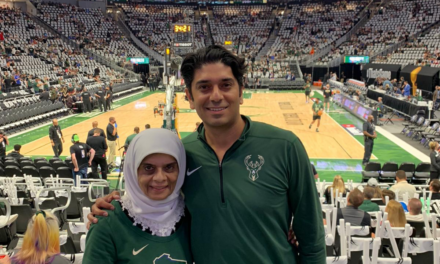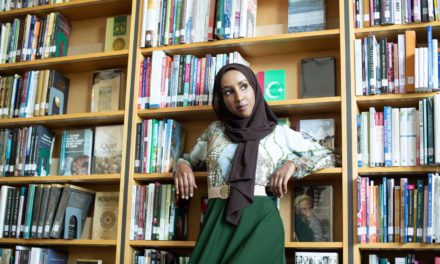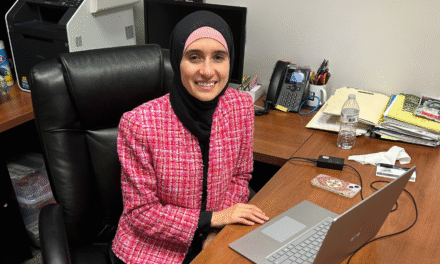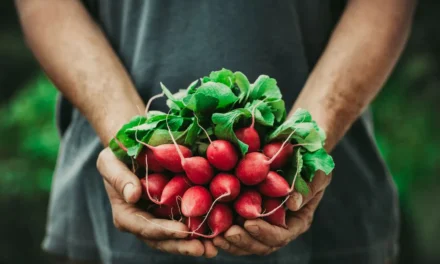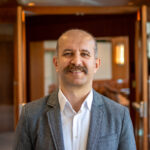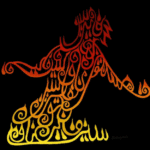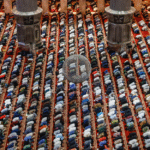Halah Ahmad completing the Coro Fellows Program
In our time, with its extreme division and civic unrest, many people are mobilizing for the first time to push for change. Streets surge with nonviolent protests, demanding a halt to racial, ethnic, economic and gender inequalities, police brutality, gun violence and climate change.
“Everyone feels a burden to do something these days,” said Halah Ahmad, a political analyst, researcher and writer from Milwaukee and now based in New York.
For Ahmad, civic engagement is not new. “The way my sisters and I were raised, I can’t even remember my first protest. It is just a part of our upbringing to be conscious of what is going on in the world, and how policy and law can fairly or unfairly influence people’s lives.”
Her family’s values and what Ahmad calls her “inexhaustible curiosity” justifies how the 26-year-old can be described on her employer’s website as having “years of experience” in policy research and analysis.
Ahmad serves as the public relations and policy communication lead at the Jain Family Institute, a nonprofit applied research organization with the mission of identifying and implementing high-impact interventions to pressing social problems. She manages JFI’s website and social media, and strategic engagement with external contacts, such as journalists, academics and policymakers. She also works on the editorial team to develop policy and communication strategies.
Ahmad is also a policy analyst with Al-Shabaka: The Palestinian Policy Network, a think tank where she formerly served as their U.S. Policy Fellow.
After earning a master’s degree in public policy from the University of Cambridge and an honors degree in the comparative study of religion and sociology from Harvard, Ahmad completed a Coro Fellowship in Public Affairs in San Francisco, “and worked on issues of urban inequality and displacement in Milwaukee, Chicago, the West Bank, Albania, Greece, Berlin and elsewhere,” her employer boasts on her bio page.
Erika Carlsen, director of the Fellows Program in Public Affairs at Coro Northern California, where Ahmad obtained intensive leadership training, said in a telephone interview, “Over the course of nine months, I had 550 hours with her as a guide and observer, seeing her in a variety of contexts. Halah is one of the brightest stars I have ever had the pleasure to work with.”
Carlsen describes Ahmad as “wise beyond her years with exceptional strategic thinking.” She works hard and is creative, and she has an aesthetic sense. “Halah brought her own frother to prepare her latte. It is an example of how she puts in the effort to make everything special, not just for her but for everyone, in everything she does.
“Halah is very deeply rooted in ethics, morals and doing the right thing. She has a strong sense of compassion. If she does not see eye-to-eye with someone, she can disagree and still maintain a connection to who they are as a person. That is a quality of strong ethical leadership.
“She is the type of person we will all say, ‘I knew her when.’”
In a Zoom interview this week with the Wisconsin Muslim Journal, Ahmad talked about the people, places and Muslim faith that has influenced her career choices and her drive to change society for the good. Her robin’s egg blue hijab brought out her blue-green eyes, which sparkled as she spoke with passion about activism and her deep concerns about the world.

Halah Ahmad with mother Judy Jent and father Yasser Ahmad

The Ahmad family: Yasser, Sommer, Yasmeen, Halah, Reema, Ameerah and Judy Jent (Not pictured: Najeah)
What have been the biggest influences on your life choices?
I am definitely influenced by my older sisters (Ahmad is the fourth of six). I learned it is up to us to take an active role in raising our voices and sharing our perspectives, which are often marginalized, whether it’s being a Palestinian, or a Muslim in America, or being a woman in a world that still has persistent sexism.
My parents have given me a lifetime of awareness. My dad’s life, being Palestinian, was determined by politics early on. His awareness has been transferred over to his daughters very saliently.
Palestinians in the Arab world, in the diaspora, face a lot of different kinds of racism and discrimination, despite this mentality that in the Arab world, everyone is sympathetic to Palestinians and the Palestinian cause. Palestinians have been marginalized in pretty much every Arab society.
My dad was a great student and cares about education. That influenced us as well.
My mom has her own story to tell about becoming a Muslim woman who wears hijab. She is a German, Polish Milwaukeean who grew up on Brady Street. But she had this new marker of difference in her life that changed the way she related to how Milwaukee defines itself, with its German, Polish and Caucasian histories.
My mom has always been a very pious person. My grandma was a pious Catholic. She was studying to be a nun before she met my grandpa and decided that the love in her heart meant there was a different calling for her. She was a school teacher and went to church almost every day. She taught my mom to be pious and my mom is a pious Muslim now.
My mom believes fundamentally everyone should be respected. That translates well politically. If you believe everyone should be respected, then you believe they should have a fair opportunity to live their lives with dignity and not be marginalized for arbitrary reasons like race, class, minority status or religion.
How has growing up in Milwaukee shaped you?
When I was wrapping up high school at Divine Savior, a Catholic school (and I went to Salam School, a Muslim school as well), I was very interested in interfaith relations and its history in Milwaukee.
I took a year off before college and I went to Palestine and volunteered with different organizations to test my interest in international affairs. I noticed some comparisons to Milwaukee. Both are very segregated communities that impact the realities in which people live. The segregation has a big negative impact on empathy, and the ability of people to relate to and understand each other.
When I started college, I studied Arabic and Hebrew, and comparative religion as my major. I came back to Milwaukee to work on the Pluralism Project as an intern. We documented religious life in Milwaukee. I found the religious communities in Milwaukee played a big role in advocating around housing in the sixties. Coalitions came out of a shared understanding.
I could see the linkages between what motivates my activism and seeking justice for others, and what motivates me to be in alignment with my religious beliefs. I realized the consistent arc that has captured my attention are the basic things that give people stability in their lives. I focused on housing displacement of different communities, starting with my research on Roma in Albania, and then focusing on housing issues in the U.S. That led to interest in the displacement issues of refugees, and I got to work on that issue through research and volunteering in Berlin and Greece.
What motivates a lot of Palestinians to be interested in international affairs and public affairs is this displacement that has led to them being scattered around the world in a diaspora. I think that thread of understanding displacement is a common thread in my work.
What role has your Muslim faith played in your career path?
I believe we are all given gifts particular to us, whether it be our circumstance, or a particular talent, or knowledge that somebody else doesn’t have. I believe we are given those to put in service—not just of ourselves—but of others.
God tasks us to be as good as God wishes us to be. And in doing so, we will be happier. I think everybody, even if in just a small way, is an agent of God’s plan and can take personal responsibility for making things better.
What are your days like?
I am reviewing Twitter, and through Twitter, different research and media outlets for what’s going on related to the CARES Act and on-going policy solutions for taking care of people during the economic downturn. I am doing a lot of outreach to people to offer relevant research that they should be paying attention to—staffers on the hill, academics who work on cash transfer or economic stimulus stuff. Sometimes its convening calls between different research groups to discuss our mutual research. And sometimes it’s the nitty gritty of writing and editing.
What are some special accomplishments?
One thing I am quite proud of is being a part of the team that brought a Muslim chaplain to Harvard. I certainly can’t take credit for it. I came at the tail end of many years of work from alumni, students and administrators saying Muslim students need a resource. That advocacy came to me from a personal place of me needing a resource and recognizing the role volunteer chaplains had played in helping me think through and process important questions in my experience of the world.
In Milwaukee, I worked for the Russ Feingold campaign in 2016 and was deeply moved by the grassroots advocacy that was at the core of Feingold’s political history in Wisconsin. I also admired the sincere commitment to public service I saw in my supervisor, Tomika Vukovic, who happens to be running for Wisconsin State Assembly now. Anytime I have met people who spend their lives advocating and writing about issues a lot of people think are intractable, whether it’s housing inequality, education, or foreign affairs, I’m inspired. People who advocate for better whether the media reports on them or not.
In my experience in the Coro Fellowship, I had the opportunity to work across different sectors and develop tangible skills. I got to see the whole landscape of public service. I received a lot of feedback that helped me see my assumptions and understand how I am heard by others with a different point of view. It’s tough love.
It was also meaningful opportunity to recognize that if you are working on change, you are in a big community of people. You are not alone.
What’s next?
That’s the hardest question. Right now, I am working on being stronger, braver and more knowledgeable when it comes to my writing.
There is an international moment right now of convergence between issues of housing, income inequality and racial justice in the United States, and Palestine and indigenous people’s rights—the long struggle of rehabilitating from colonization and the ever-present imperial powers that dictate a lot of people’s lives in the Global South. There is a unique opportunity for me to work on issues of U.S. welfare policy, which I’m passionate about. And there’s an opportunity now to work across borders. There’s also climate change, a far-reaching issue that will involve serious conversations about how the most disadvantaged will weather those shocks. There are immigration issues and racial justice issues. What I see myself doing is trying to synthesize the ways those things intersect, and speak out and take action in whatever way I can.
What do you mean you want to be “braver” about your writing?
In college, I sometimes wrote op-eds I didn’t put my name on because speaking about certain issues has ramifications. We haven’t built accountability systems that make it possible for certain people to speak up. Palestinians face that all the time. There is growing repression of Palestinian voices in the United States, just as much as there is a growing fight against it. Palestinians are being repressed for their critique of Israel. That is something that plays in my mind. There will always be a trade-off.
A lot of people are making it more possible than ever to speak up about issues of injustice because they are taking public hits – Rashida Tlaib and Ilhan Omar are good examples.
I carry a lot of respectability privilege because of my degrees and I have the support of different communities of activists. I try to keep that in mind.
But it is a really hard time to be vocal. It is very easy these days for people to come after you on the internet for things that may not be true. There have been a lot of recent examples of that.
In a “post-truth world,” I find myself trying to contribute writing that has a strong basis in research and self-critique.
Recent writing:



